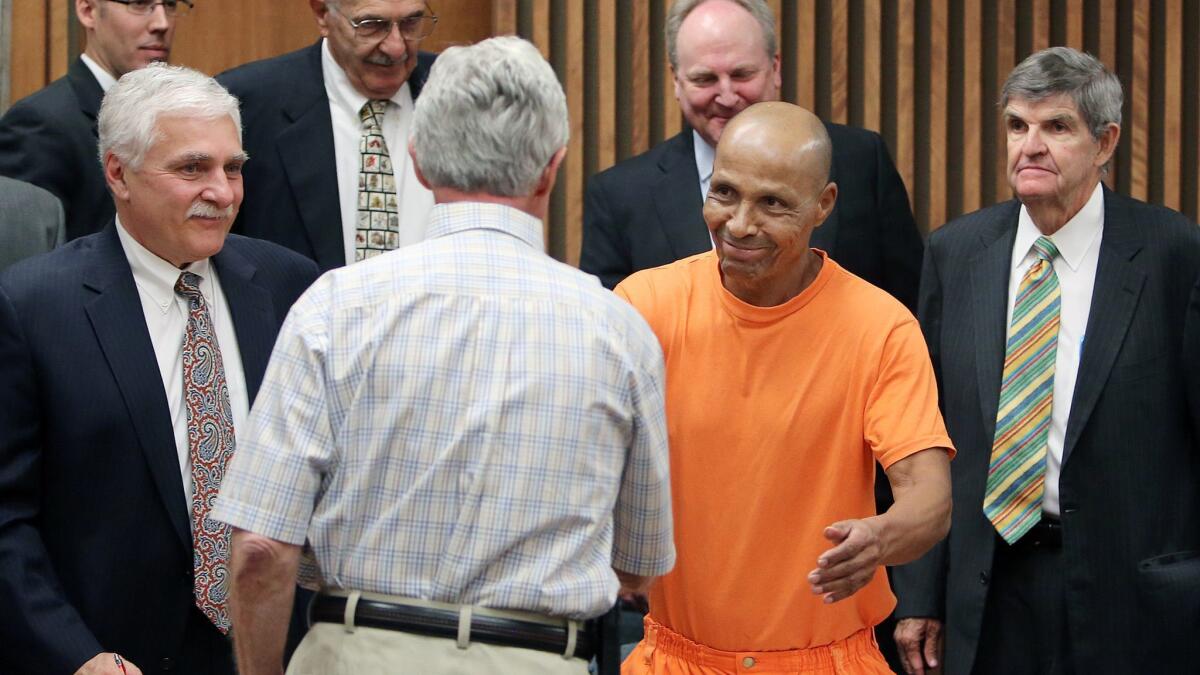After four decades, a wrongful-conviction case with racial overtones still reverberates

- Share via
Reporting from San Francisco — Louis Taylor was 16 when police arrested him in 1972 on suspicion of deliberately setting a fire that killed 28 people at a Tucson hotel.
Though he adamantly insisted on his innocence, Taylor, who is African American, was sentenced to 28 life terms for what was deemed a mass murder at the Pioneer Hotel. He was near the scene when the fire started.
“He was convicted on the basis of little more than that proximity and trial evidence that ‘black boys’ like to set fires,” U.S. 9th Circuit Court of Appeals Judge Mary M. Schroeder wrote Thursday.
Taylor won release in 2013 after 42 years in prison when an innocence project presented evidence that the fire was not deliberately set.
On Thursday, the 9th Circuit decided 2 to 1 that Taylor may not be compensated for the years behind bars because he had accepted a deal to get out of prison.
Prosecutors said they disputed the exonerating evidence, but offered him immediate release if he agreed to plead no contest to the charges.
Rather than waiting years longer for his challenge to wind its way through the courts, Taylor accepted the deal. In exchange, he received a sentence of time served.
That deal, according to the 9th Circuit, means he cannot be awarded damages for the years he spent in prison.
“Taylor’s 2013 conviction, following his plea of no contest, remains valid,” 9th Circuit Judge Susan P. Graber, a Clinton appointee, wrote for the majority.
Schroeder, a Carter appointee, said Taylor should be compensated for wrongful conviction.
“This decision magnifies an already tragic injustice,” she wrote.
Taylor did not fare well after leaving prison. Most of his family had died when he was behind bars.
At the age of 63, four years after his release, Taylor was arrested on suspicion of an armed robbery at a hotel. He is once again behind bars.
The Arizona Republic reported that Taylor had been homeless prior to the robbery arrest and had earlier been charged with possession of marijuana and drug paraphernalia.
He had been released at a time when experts were reevaluating fire science.
It had changed dramatically from previous decades, and experts believed shoddy forensics were to blame for many wrongful convictions.
They included that of George Souliotes, a Californian who was released from prison in 2013 at the age of 72, and Todd Willingham, who was executed in Texas in 2004 before evidence emerged that the fatal fire he was charged with starting was accidental.
The fire at the Pioneer Hotel ignited while employees of an aircraft company were inside celebrating at a Christmas party.
Many guests were trapped in their rooms, and fire truck ladders were too short to reach the upper floors. Some people jumped to their deaths. Others burned in their rooms or died from carbon monoxide poisoning.
Taylor had been helping victims escape before his arrest. Prosecutors portrayed him as an incorrigible grade school dropout. He had matches in his pocket when police took him into custody.
“Over the years, he’s been offered his freedom if he would admit that he did it,” attorney Michael Piccarreta told The Times in 2013, when Taylor was released. “If he did that, people would make recommendations for clemency, for the government to commute his sentence. But he was adamant.”
Piccarreta said that Taylor “almost didn’t take” the deal that would secure his release.
“He didn’t want any inference that he was guilty, but we explained to him that you can plead no contest and still maintain your innocence,” the attorney said.
Graber said the Thursday’s majority ruling was in line with decisions by other circuit courts.
Released inmates “may not recover incarceration-related damages for any period of incarceration supported by a valid, unchallenged conviction and sentence,” she wrote, referring to the no-contest conviction.
“We take no pleasure in reaching this unfortunate result, given Taylor’s serious allegations of unconstitutional actions,” she added.
Schroeder, in her dissent, noted that prosecutors never responded to Taylor’s allegations that evidence had been withheld and that the case had been infected by racial bias. An all-white jury convicted Taylor.
Instead, prosecutors offered him immediate freedom in exchange for pleading no contest, she wrote.
Thursday’s decision misinterpreted the law, she said.
“In my view, our law is not that unjust,” she wrote.
She described the arson conviction as “so deeply tainted that we now know the disastrous fire may not have been set by anyone, and the prosecution was without adequate foundation from the beginning.”
Taylor won “virtual exoneration,” she wrote.
She called his decision to plead no contest “the product of his desperate circumstances.” He was about to turn 60, and a habeas corpus challenge could have taken years to resolve.
“We should not tolerate such coercive tactics to deprive persons of a remedy for violations of their constitutional rights,” Schroeder said. “To say such a plea justifies the loss of 42 years, as the majority asserts, is to deny the reality of this situation and perpetuate an abuse of power.”
John P. Leader, a former federal prosecutor who represents Taylor in the 9th Circuit case, said he is considering asking a larger panel to review the ruling.
He called Taylor’s history “very sad” and his prosecution for arson “deeply troubling.”
Taylor was released to the community after 42 years in prison without any services or even temporary housing to help with the transition, Leader said.
“I question whether anybody could have expected him to succeed going straight from an institutionalized setting to being a free man,” Leader said. “That is a difficult situation for anybody, and he was only 16 when he was incarcerated.”
Twitter: @mauradolan
More to Read
Sign up for Essential California
The most important California stories and recommendations in your inbox every morning.
You may occasionally receive promotional content from the Los Angeles Times.














